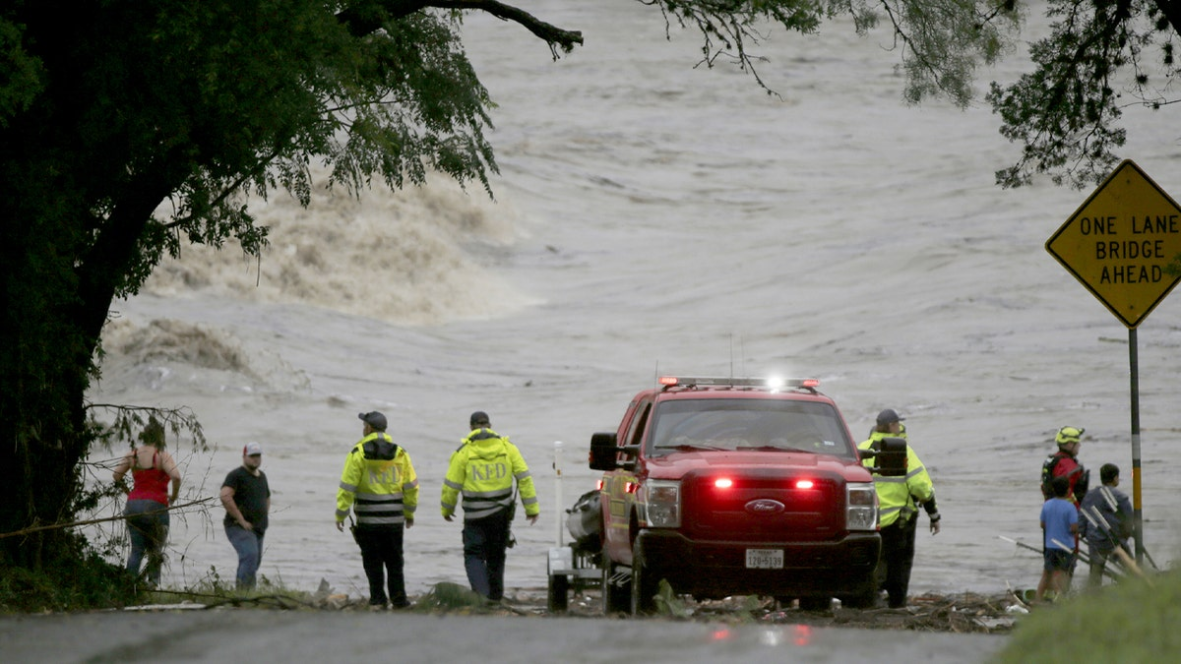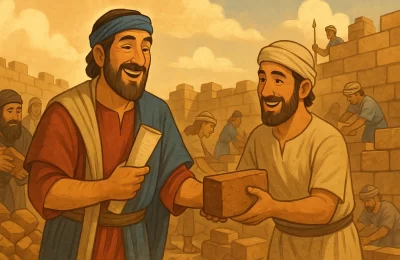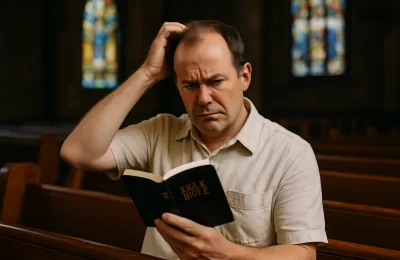Reflections on the July 2025 Texas Hill Country Flood.
The night the flood came, the world was sleeping.
It was the kind of night Hill Country folks know well: hot, still, the air thick with summer. The last of the fireworks cracked over the Guadalupe. Campers at Mystic whispered secrets in the dark. Families along the riverbank slept, lulled by the chorus of crickets and the hum of a holiday well-spent.
And then, the rain began.
At first, a soft patter on rooftops. Then harder. And harder. Until the sky seemed to split in two. A month’s worth of water fell in hours. The Guadalupe, a river of peace, became a monster in the night, swallowing cabins, homes, cars, and entire neighborhoods. By dawn, what once was life-giving water had become a grave.
Eighty-two souls gone. Twenty-eight children. Ten campers and a counselor still missing.
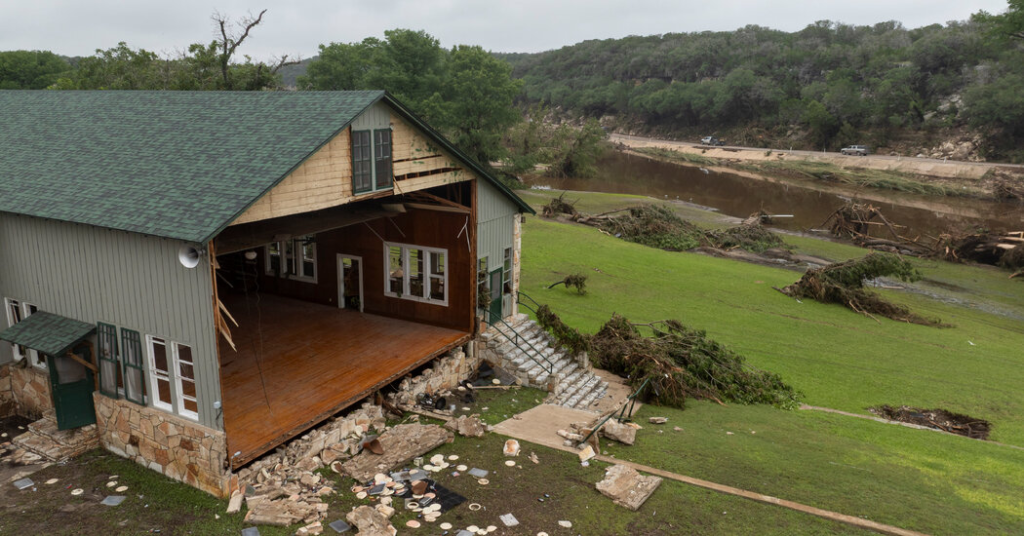
I watched the images from my own living room, and I could smell it – the mud, the ruin, the sorrow. Because I’ve been there. In 2018, our home flooded. I remember the sound of water invading our safe place. The frantic scramble to save what could not be saved. The hollow feeling of explaining to my kids why their world was underwater.
I remember walking the shattered streets of Denham Springs, where the flood had even robbed the dead. I saw coffins floating down roads like driftwood, as if death itself had been unmoored. I’ve stood in living rooms where families stared at waterlines on walls, at photo albums turned to pulp. I’ve tried, and failed, to find words that heal in moments like these.
And so we ask the questions that haunt us all: Why? Where was God? Could this have been stopped?
In the rush to find a reason, we sometimes cling to blame. We long for answers, but too often grab at shadows. What I’ve found, in my own grief and in the grief I’ve witnessed, is that peace doesn’t come from explanation. It comes from an encounter. And no story brings that into focus more than Job’s, a man who lost it all, and met God in the whirlwind.
The Storm Strikes: Tragedy Without Clear Cause
When the floodwaters rose, they didn’t pause to ask who deserved to be spared. They didn’t choose their path by the goodness of a family, the faithfulness of a camp counselor, or the innocence of a child. The water simply came—fast, fierce, unstoppable—and left a trail of heartbreak in its wake. And now, as we stand on the other side of the storm, we are left with the questions that come as surely as the flood itself: Why? Why them? Where was God?
These questions aren’t signs of weak faith. They are the honest cries of a heart trying to make sense of sorrow. And they take us straight to the story of Job.
Job wasn’t a man who had earned disaster. The Bible introduces him this way: “There was a man in the land of Uz whose name was Job; and that man was blameless, upright, fearing God and turning away from evil” Job 1:1. He was the kind of man we’d admire in our churches today, honest, generous, faithful. And yet, in a single day, Job’s life was shattered. His wealth was stolen. His servants were murdered. His children died in a storm. His body was wracked with disease.
But none of this was because he had sinned. God Himself called Job His servant, a man unlike any other (Job 1:8). Job’s suffering wasn’t punishment. It wasn’t the consequence of hidden failure. And that’s a truth we need to hold tightly when we see floods like the one that devastated Texas.
The waters didn’t rise because those families were faithless. The river didn’t surge to punish sinners while sparing saints. Jesus reminded us that God sends rain on both the righteous and the unrighteous (Matthew 5:45). The world is broken. Creation groans under the weight of sin’s curse (Romans 8:22). Storms, floods, disease—these are part of that groaning. They are not always God’s judgment. They are often the bitter fruit of a world waiting for redemption.
And so, beloved, let’s be gentle with our hearts and with each other. The call in times like this is not to assign blame or search for secret faults. The call is to weep with those who weep. To hold the hands of the grieving. To be present in the sorrow. And above all, to remember: the floodwaters do not define God’s love. The cross does.
The Search for Blame and the Danger of Easy Answers
Whenever disaster strikes, we humans do what we’ve always done: scramble for an explanation. Surely someone is to blame. Surely this wouldn’t have happened if the right people had been in charge. We cling to the comforting illusion that if we can just name the culprit, we can prevent the next catastrophe, as if human wisdom or policy could stop the heavens from opening.
Job’s friends tried the same thing. When they first arrived, they did the best thing possible—they sat with Job in silence for seven days (Job 2:13). No speeches. No theories. Just presence. But then, the silence broke. And out came their “help.” Eliphaz suggested Job must have sinned: “Who that was innocent ever perished?” (Job 4:7). Bildad hinted that Job’s children got what they deserved (Job 8:4). Zophar flat out declared Job guilty, and lucky not to have suffered more (Job 11:6).
Job’s wife, devastated and raw, uttered what many might have thought: “Curse God and die” (Job 2:9). She’d seen enough heartbreak to wonder if it was better to give up on faith altogether.
Fast forward to our time, and we see the same dance play out. Within hours of the flood, the search for a scapegoat began. It was the Trump-era DOGE cuts! they cried. Those budget slashes gutted the National Weather Service, leaving offices understaffed, data thin, and warnings too late (The Guardian, Benicia Independent). Others pointed fingers at state and local authorities, or even at neighbors who didn’t evacuate in time.
And then came the wilder whispers: Maybe the flood was orchestrated. Maybe warnings were withheld on purpose. Because, of course, the real enemy must be hidden behind some curtain, pulling the strings, controlling the weather, controlling the storm. As if mere mortals could leash the sky.
But Jesus spoke plainly about disasters: “Do you think they were worse offenders… because they suffered? No, I tell you…” (Luke 13:4–5). And God’s response to Job’s friends applies to us: “Who is this that darkens counsel by words without knowledge?” (Job 38:2).
Let’s not kid ourselves. We don’t control the rain. We don’t control the rivers. We don’t control the storm. What we can control is how we respond: with humility, with compassion, and with the wisdom to stop speaking when we don’t know what we’re talking about.
Light in the Darkness: The Heroic Response
The floodwaters came like a thief in the night, rising faster than warnings could reach, faster than families could flee. But when the river roared, something else rose too. Something the flood couldn’t drown.
It was love.

Love looks like Julian Ryan. Just 27 years old. A fiancé. A father of two. When the water surged into his home in Ingram, Julian didn’t hesitate. He didn’t wait for help. He became help. With water clawing at his walls, he punched out a window with his bare hands so his family could escape. The glass tore at him. The flood rose around him. But he wouldn’t stop—not until they were safe. His last words weren’t grand speeches. They were the words that mattered most: “I love y’all.” He gave everything so they could live. (KBTX)
Love looks like Scott Ruskan, a Coast Guard swimmer facing what must have seemed like an endless sea of need. In a single day, Scott helped rescue 165 people. Children lifted from roofs. Elderly pulled from swirling water. Fathers, mothers, neighbors—all given another chance at life because Scott chose to enter the flood rather than stand at its edge.
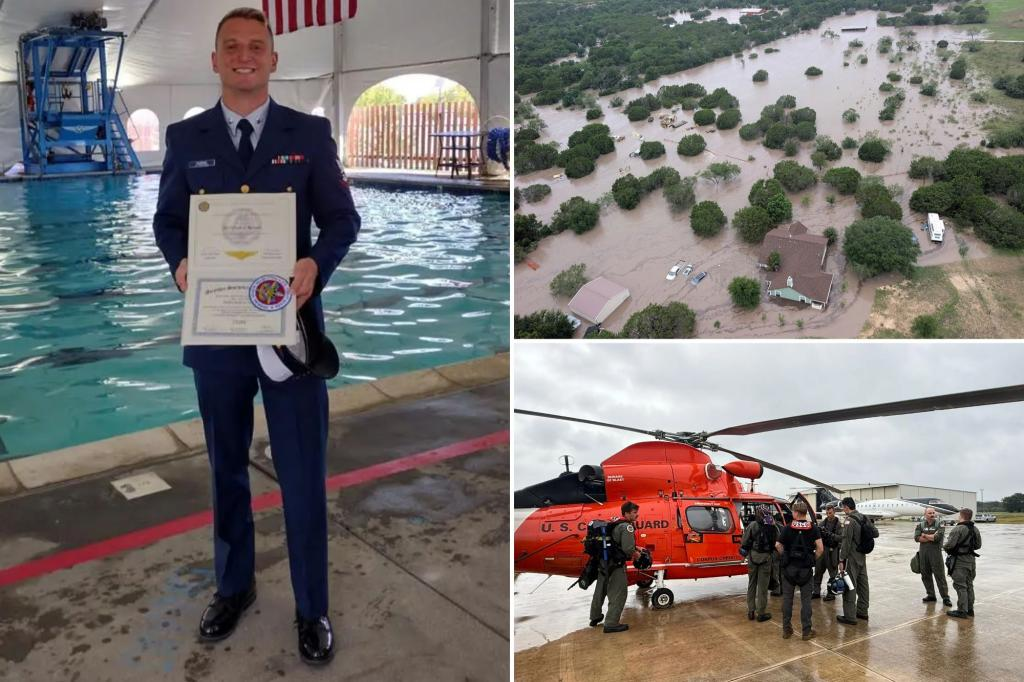
Love looks like the churches that flung wide their doors, turning fellowship halls into shelters, kitchens into command centers. It looks like the neighbor who brought a stranger’s children to safety. Like the volunteers who drove across state lines with nothing to offer but their hands, their tools, their prayers.
In moments like these, we see the image of God shining through cracked vessels. The flood stripped everything bare, but it could not sweep away compassion.
Job’s friends, for all their later failings, got one thing right. “Then they sat down with him on the ground for seven days and seven nights with no one speaking a word to him, for they saw that his pain was very great” (Job 2:13). Before their words wounded, their silence comforted. Their presence said, “You are not alone.”
That’s what the world needs in the aftermath of a storm like this—not theories, not blame, not easy answers. It needs love that stays. Hands that help. Hearts that ache with the hurting.
Because when the waters rise, heroism isn’t in knowing why. It’s in choosing to stand with the broken. It’s in Julian’s sacrifice. In Scott’s courage. In every act of quiet mercy that says: “You are not forgotten. You are not alone.”
And that—that—is light the flood can’t extinguish.
The God Who Speaks from the Storm
When the floodwaters recede, what remains?
There’s the mud, yes. The broken walls, the empty chairs, the photographs that can’t be replaced. But beneath all that, it’s the questions that linger longest. Why did this happen? Where was God? Couldn’t He have stopped it?
If you’ve asked those questions, dear friend, you’re not alone. Job asked them, too. A man who walked with integrity, who loved God, who blessed his neighbors—he lost everything. His wealth, his health, his children. And in his pain, Job longed for answers. He cried out for a hearing with God. He wanted reasons. He wanted to know why.
And then, God came. But He didn’t come with explanations. He didn’t lay out a list of causes or a chart of secret purposes. Instead, God met Job with something far deeper: His presence.
“Where were you when I laid the foundation of the earth? Tell Me, if you have understanding” (Job 38:4).
God spoke of oceans He holds in check, of light and storm He commands, of the storehouses of snow, of the boundaries He set for the sea. His voice came not to shame Job, but to remind him—and to remind us—that this world is not out of control.
It may feel that way when the river rises. It may feel that way when we stand in what used to be home. But our feelings don’t change the truth: God is sovereign.
“Whatever Yahweh pleases, He does, in heaven and on earth, in the seas and in all deeps” (Psalm 135:6). “Are not two sparrows sold for a cent? And yet not one of them will fall to the ground apart from your Father” (Matthew 10:29).
Not one drop of rain falls, not one river surges, without His knowledge and command. And because that’s true, we can do what Job did. We can surrender our “whys” into His hands.
“I know that You can do all things, and that no purpose of Yours can be thwarted… Therefore I have declared that which I did not understand, things too wonderful for me, which I did not know” (Job 42:2–3).
We may not know why this flood came. But we know who holds us through it. And He is good. He is wise. He is near. The God who speaks from the storm is the same God who walks with us in it. And He will not let us go.
Lament That Leads to Hope
There is a sacred kind of grief that the Bible not only permits, but invites—a grief that doesn’t turn its back on God in bitterness, but runs to Him with tears. The Bible calls this lament. And in Job’s story, we see lament in its purest form.
Job didn’t hide his sorrow. He didn’t try to put on a brave face. When disaster struck—when he lost his wealth, his health, and his beloved children—Job did what a grieving father does. He tore his robe. He shaved his head. He fell to the ground. But listen to what happened next: “And he fell to the ground and worshiped. And he said, ‘Naked I came from my mother’s womb, and naked I shall return there. Yahweh gave and Yahweh has taken away. Blessed be the name of Yahweh’” (Job 1:20–21).
His lament wasn’t faithlessness. It was worship.
Job’s grief wasn’t polished. It wasn’t neat. In Job 3, he cried out: “Why did I not die at birth, come forth from the womb and breathe my last?” In Job 7:11, he confessed, “I will not restrain my mouth; I will speak in the anguish of my spirit; I will complain in the bitterness of my soul.” These weren’t pretty prayers. They were gut-wrenching. And God welcomed them.
“Pour out your heart before Him; God is a refuge for us” (Psalm 62:8). “Yahweh is near to the brokenhearted and saves those who are crushed in spirit” (Psalm 34:18).
Biblical lament keeps us connected to God. It says, “I don’t understand—but I’m still talking to You. I’m still turning to You.” That’s why Job could say, even at his lowest point, “Though He slay me, I will hope in Him” (Job 13:15). Trust and anguish aren’t enemies in the life of faith. They are companions on the hard road.
I’ve seen this truth play out over and over again in the field.
When we provide emotional and spiritual care in disasters, we often use something called Individual Crisis Intervention—part of a system known as Critical Incident Stress Management (CISM), designed to help first responders and survivors begin to process what they’ve endured. It’s not magic. It’s simply listening well and asking questions that help people take their first steps through the storm of grief.
I’ve sat in burned-out apartment complexes with mothers who had lost a child in a fire. I’ve stood on riverbanks with neighbors who watched helplessly as floodwaters swept loved ones away. I’ve been with families shattered when their child committed heinous acts, and then took his own life.
In those moments, we guide them gently, asking simple but profound questions. What happened? What was the hardest part? Has anything like this ever happened to you before? And finally—after the silence, after the tears—we ask the question that feels almost too hard to speak:
“With all that you have been through, what good do you see that has come out of this?”
I know how that sounds. It feels impossible to answer. How do you ask that of a mother who has buried her child? How do you ask that of a man who has seen his neighbor taken by the flood? But we ask—not because we expect easy answers—but because somewhere, even in the deepest darkness, hope flickers.
It might take time. It might take years. But eventually, a glimmer appears. “I saw how my community showed up.” “I know now how precious life is.” “I’ve learned what really matters.”
Lament doesn’t erase the loss. But it keeps us facing toward the God who alone can redeem it. And where God is, hope remains. Always.
What We Do Now: Walking in Trust and Service
So, what do we do now, folks? The water’s gone down, but the mess is still here. The headlines will move on, but the work—the real work—is just getting started. And if you’re wondering what a Christian’s job is in a time like this, let me tell you plain: this is where the rubber meets the road.
First, let’s drop the blame game. Leave the conspiracies alone. We can argue about who should’ve done what, who cut what budget, or whether warnings came fast enough. But at the end of the day, that won’t clean mud out of a neighbor’s house. That won’t comfort a grieving mother. That won’t rebuild a life. Let’s spend our strength doing something that matters.
Second, let’s honor the heroes. Don’t forget Julian Ryan, who gave his life so his family could live. Don’t forget that Coast Guard swimmer who pulled 165 people to safety. Don’t forget the neighbors who tied ropes to porch posts and went looking for folks in the dark. Let’s thank God for people who ran toward the flood instead of away from it.
Third, let’s show up—and stay. It’s easy to show up when the TV cameras are around. It’s harder when the spotlight fades, and the real work starts. But that’s when folks need you most. They don’t need speeches. They don’t need you to quote Job at ‘em. They need your hands, your time, your prayers, and sometimes just your quiet company.
Fourth, let’s trust the Lord. He hasn’t left the throne. He hasn’t taken His hand off the steering wheel. The flood didn’t surprise Him. He’s still in charge, even when it doesn’t make sense to us. Our job? Trust Him. Even when it’s hard.
And finally, don’t let go of hope. Job said, “I know that my Redeemer lives” (Job 19:25). And friend, so do we. One day, He’s going to wipe away every tear. Until then, let’s do what we can, where we are, with what we’ve got—and trust God to do the rest.
Conclusion: Blessed Be the Name of the Lord
When we look back on this flood, we won’t just remember numbers on a page. We’ll remember the faces. The empty chairs at family tables. The bedrooms that will stay quiet. The toys left behind. We’ll remember the sound of the river when it stopped being a friend and became a thief.
But let’s also remember the love that rose higher than the waters. The fathers and mothers who gave everything so someone else could live. The neighbors who became family. The strangers who stayed when the cameras left. The quiet heroes who showed up with nothing to offer but their hands — and that was enough.
And yes, we’ll remember the questions. Why, God? Why them? Why now? If you’ve asked that, you’re not weak in faith — you’re human. Job asked the same. He wept, he wrestled, he wondered if God had forgotten him. But in the end, when God answered, it wasn’t with explanations. It was with Himself. And somehow, that was enough.
“Now my eye sees You” (Job 42:5).
So what do we do now? We trust. Even when it’s hard. We serve. Even when it hurts. We stay. Even when it’s uncomfortable. We point as best we can to the One who holds it all together — the One Job called Redeemer, the One we know as Christ.
We don’t have to have all the answers. We just have to cling to the One who does. And one day — oh, one day — He will wipe away every tear, calm every storm, and make all things new (Revelation 21:4).
Until that day, may we find the grace to say, even through our broken hearts:
“Blessed be the name of the Lord.”



